Al-Zaytouna Center for Studies and Consultations and the Palestinian Association for Human Rights (Witness) held a conference on 23/10/2014, on The Accession of the State of Palestine to the International Criminal Court and Possible Outcomes at the Crowne Plaza Hotel in Beirut.
The conference, which had three main sessions, was attended by a group of elite legal experts and experts on Palestinian affairs, who discussed the State of Palestine’s accession to the Rome Statute, the prospects for prosecuting Israel and Israeli leaders, and the expected outcomes of Palestine resorting to the International Criminal Court (ICC).
The participants discussed the legal status of the Palestinian territories, the role of international human rights institutions and their role in the realization of international justice, and the Israeli violations in the assault on the Gaza Strip (GS) and their classification according to international law.
Opening remarks and the First Session
In the beginning, Prof. Dr. Mohsen Mohammad Saleh, general-manager of Al-Zaytouna Center, delivered the opening speech, welcoming the guests and overviewing the most salient topics the conference program would be addressing. Saleh underscored the importance of speaking plainly without avoiding any issues, determining the correct approaches to dealing with the ICC in particular and international institutions in particular, and serving Palestinian and Arab decision-makers.
He added: We suffered enough from lack of specialty, skill, competence, and poor marketing. Saleh then pointed out that more than 280 cases have been brought in international courts and Western European countries against Israel, most of which were dismissed because of lack of jurisdiction or the failure to present the necessary documents and follow the proper procedures.
The first session was moderated by Dr. Bassem Alem, lawyer and legal adviser. The speakers included Dr. Mahmud Hanafi, general-manager of the Palestinian Association for Human Rights (Witness), Nadim Houry, Deputy Director of the Middle East and North Africa Division of Human Rights Watch, and Dr. Suhail al-Natour, writer and legal expert.
In the context of his description of the legal status of the occupied Palestinian territories (Gaza Strip as a model), Hanafi said that the evidence and legal texts demonstrate clearly that Israel occupies GS. Thus, the occupation entails responsibility and duties that Israel is compelled to fulfill, for having declared hostility, in addition to its continuing occupation of GS.
He said: the provisions of international law, especially criminal provisions to punish the perpetrators of Israeli war crimes, will be applicable more than ever before. For Israel has flouted all humanitarian considerations when it stopped food supplies and blocked the basic needs of the population including energy supplies, according to its whims without taking into account the bare minimum needs of the civilian population.
Houry spoke about the role of human rights and international organizations in serving international justice (Human Rights Watch as a model), and said that suing Israel in the ICC would be for publicity, because such a course of action would benefit no one. Houry’s argument was Israel could not be prosecuted per se, saying what is possible is to prosecute specific people and leaders, and underscored the importance of naming the perpetrators of war crimes.
For his part, al-Natour talked about Israeli violations during the Israeli assault on GS, and their classification under international law. He pointed out that the problem is that the Palestinian side does not take any initiative towards taking legal action, and that it was the UN Human Rights Council, from 2009 to the present time, who was taking these initiatives.
Natour explained that Israel designates its wars on GS as “operations,” in case of any international legal action and to avoid bearing any consequences for designating it as a war. Natour called on the Palestinians to realize the importance of designations and their legal consequences.
Second Session
The second session was moderated by Ma‘an Bashour, Arab nationalist commentator and thinker. Speakers included Dr. Shafik Masri, international law professor, ‘Ammar Melhem, legal expert on Palestinian affairs, and Dr. ‘Abdul-Rahman Ali, a professor of international law as well.
Masri presented his paper on the accession of the State of Palestine to the Rome Statute and the pros and cons of the move, and the best way to approach the subject. He raised questions regarding the ability of the Palestinian Authority (PA) to fulfill the requirements of joining the statute. Masri indicated that the State of Palestine, before applying to join, represents in the eyes of the ICC a “non-party state” in the court, meaning that it is not bound by its rulings and decisions unless it consents to this voluntarily, expressly, and in writing.
Masri said that joining the ICC carries some risks, including the issue of the legal status of the occupied territories. After the Oslo Accords, he continued, Israel sought to impose a new status, namely, designate them as “disputed territories.” Another risk involves Israel’s demands to investigate with a number of Palestinians before the ICC.
At the conclusion of his presentation, Masri stressed the need to: maintain the designation of the Palestinian territories as territories occupied by Israel; adhere to the advisory opinion on the Israeli wall in the West Bank; cling to international texts on international guarantees for the rights of refugees and self-determination and other inalienable rights; and act to accede to other international organizations and work hard to revive recognition by states of Palestinian statehood.
Melhem then presented his paper on the prosecution of Israel and Israeli leaders, pointing out that among the legal course of action available through international courts and bodies against Israel is resorting to national judiciaries that adopt the principle of “international jurisdiction,” special tribunals established through a resolution taken by special emergency General Assembly sessions, the International Court of Justice, and complaints and lawsuits that are possible and necessary to file with many international organizations and agencies. Melhem also spoke about the need of the Arab group at the UN and its international allies to reactivate the role of the emergency General Assembly special sessions of the UN, and lobby the League of Arab States to complete an “Arab judicial treaty,” which must be independent and effective. He also spoke about the ICC, which is the main theme of the conference.
In his paper on Palestine and the ICC, Dr. ‘Abdul Rahman ‘Ali explained the jurisdiction of the ICC—objective, temporal, and regional—and the restriction of the jurisdiction of the Court by the Security Council. ‘Ali then highlighted the importance of Article 12, paragraph (3) of the Rome Statute; which allows a state, whether or not it is a party to the Rome Statute, to grant the court jurisdiction to investigate crimes committed since 1/7/2002.
‘Ali explained that there are three options available to the Palestinian side to benefit from the Rome Statute, especially after Palestine became a non-member observer state at the UN. These options include:
First: Resorting to Article 12, paragraph (3) without joining the statute, which would see Palestine accepting to cooperate with the court in its investigations into crimes possibly committed by the Israeli army or the Palestinian factions equally.
Second: Joining the statute as well as using Article 12, paragraph (3). This would give the court jurisdiction to investigate crimes that took place after accession and the date it enters into force as concerns Palestine, in addition to the requirements mentioned earlier for this clause.
Third: This option, which ‘Ali prefers, would be to join the statute without including the declaration under Article 12, paragraph (3); which means that the court would investigate crimes that take place after the date of accession without investigating with the Palestinian factions. ‘Ali also called on the Palestinian side to focus on the issue of settlement building as a war crime, illegal detention, and the lack of fair trials, in addition to other crimes that the court is urged to investigate.
Third Session
The third session, which was moderated by lawyer ‘Abdul ‘Aziz Jum‘ah, included presentations and discussions regarding the practical value of Palestine joining the ICC, the assessment of the role of the court and its ability to deliver, and prospects for prosecuting the leaders and symbols of Palestinian resistance, as well as the best ways to deal with the court.
Dr. Hussein Abu al-Naml said that the legal battle is part of the political battle, which in turn is part of the conflict with the enemy. The issue has multiple dimensions, he said, pointing out that the legal framework must find legitimacy and legal value at home before doing so abroad.
The Lawyer Khaled al-Shouli explained that there are four points that must be focused on, namely, the practical value of Palestine taking action at the ICC, the assessment of the role of the court and its capacity to deliver, and the best ways to deal with the court as well as the political dimensions of the move.
Dr. Amin Hoteit pointed out that law and politics are mutually influential, which he said was very positive. In actual reality, he continued, law is influenced by politics, and it is from this standpoint that we should discuss Palestine’s accession to the international court. Hoteit added that two or three decades ago, we have become convinced that international justice is politicized and used by the super powers as leverage over those countries they cannot send armies to.
The Lawyer Mustafa Nasrallah raised questions regarding why Israel has not been held accountable in the countries whose nationalities are carried by Israeli leaders, stressing the importance to activate national laws in this regard, which does not require a lot of courage and is not controversial, as he said.
On the other hand, ‘Ali Barakah, Hamas’s representative in Lebanon, said that the path to liberation is the armed resistance. However, he continued, the role of fighters on the battlefield does not preclude using other means as well, saying that that the Palestinian people will not liberate Palestine on their own and need help from the entire world.
Barakah pointed out that Hamas’s support for Palestinian action at the UN to obtain the status of non-member observer state, included support for obtaining the ability to prosecute Israel, that is, to sign the Rome Statute.
Tackling challenges and obstacles, Researcher Wissam Abu ‘Issa said the problem was the lack of a unified Palestinian leadership or project, pointing out that Palestinian moves have been little more than tactics to serve personal visions and certain policies.
Dr. Suhail al-Natour said that the Arab regimes block the trial of some leaders of the occupation who carry Arab passports. For example, the trial of an Israeli officer from Morocco who took part in Operation Protective Edge was blocked. Al-Natour also said that instead of inviting Tzipi Livni to give a lecture in an Arab country, she should have been prosecuted in that country.
Researcher Majed Abu Diak echoed Abu Issa’s views, saying that the problem is the lack of a unified Palestinian decision, though he said this should not prevent Palestinians from finding a mechanism to manage the conflict.
The Legal Expert on Palestinian Affairs ‘Ammar Melhem stressed the need to adhere to Palestinian law before international law, by reactivating the Palestinian National Council, which is the supreme authority of the PLO that develops its policies and programs.
In turn, ‘Ali Howaidy underscored the importance of having what he called an army of legal experts to fight this legal battle, saying this requires time and effort. He also stressed that taking legal action does not eliminate the need for political action and pressure on decision-making.
Dr. Abdul-Rahman Mubashir supported Howaidy’s views regarding the need for an army of legal experts, and noted that prosecuting Israeli leaders, even though symbolical, would have very important strategic benefits.
In response to the concerns raised about the possibility that joining the ICC could give the latter the right to prosecute resistance leaders, he said that from a procedural point of view, the court may tackle all issues including investigating whether crimes have been committed by the resistance. He noted that the court does not prosecute individuals but those who give orders.
Dr. ‘Abdul Rahman ‘Ali indicated that in the event the Palestinian Authority goes to the ICC, the prosecutor may hold a comprehensive trial, to include some of the parties in the resistance, noting that this should not prevent Palestine from going to the to court.
Concluding Remarks
At the conclusion of the panel discussion, Prof. Dr. Mohsen Mohammad Saleh thanked the audience, especially Dr. Mahmud Hanafi, who was behind the idea of the conference. Saleh praised the ideas and proposals, stressing the need to pay attention to such important issues in research. He added that the Israel is not a charity, and will move from conflict to conflict, saying that confrontation is therefore inevitable along multiple paths to fulfill Palestinian rights.
For his part, Dr. Mahmud Hanafi thanked the attendance, stressing that the accession to the ICC needs a Palestinian political decision, a network relations and balance of powers, saying that there is no alternative to Palestinian political unity, which would pave the way for a legal and political achievement.



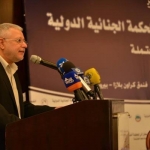
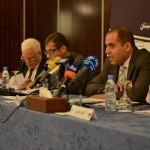
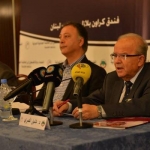
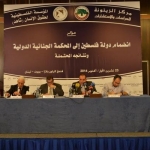
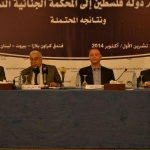
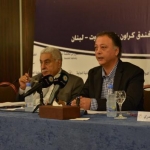
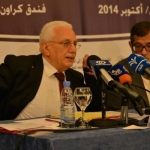
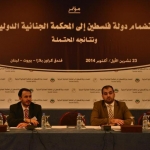
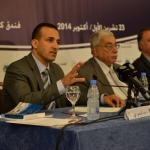
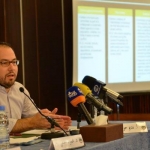
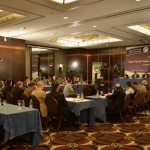
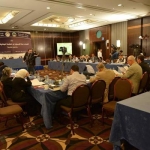

Leave A Comment